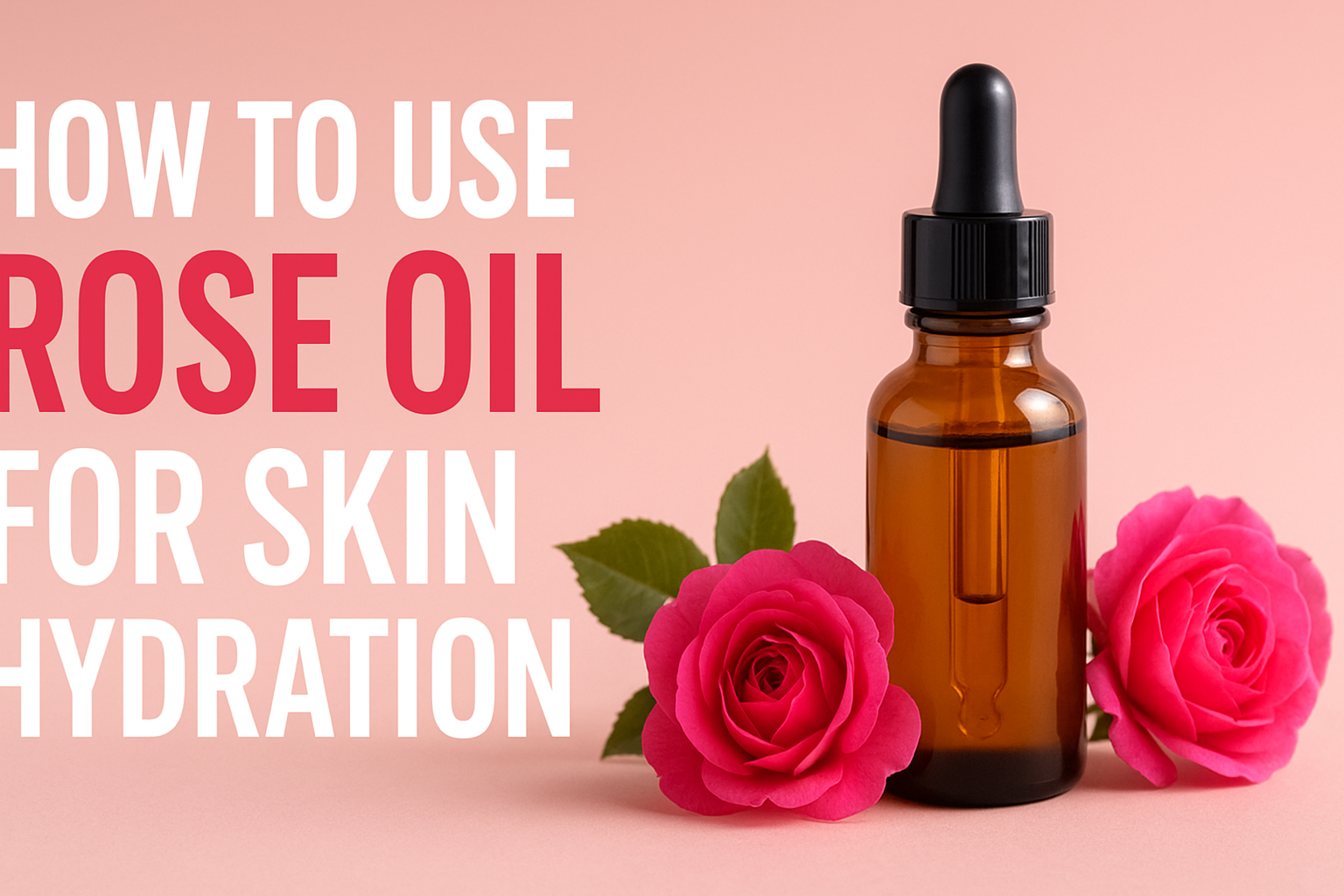Introduction: Nature’s Elixir for Radiant, Moisturized Skin
If your skin feels dull, dry, or tired, rose oil might be the luxurious secret your skincare routine has been missing. Known for its enchanting aroma and powerful hydrating properties, rose oil has been cherished in Ayurveda and aromatherapy for centuries. Whether you’re looking to restore moisture, calm irritation, or achieve that natural glow, learning how to use rose oil for skin hydration can transform your self-care ritual.
Rose oil—especially from Rosa damascena or Rosa centifolia—is packed with antioxidants, vitamins A and C, and natural emollients that help lock in moisture. Its high content of fatty acids and phenolic compounds makes it a star ingredient for people dealing with dehydration or sensitivity.
What Makes Rose Oil Ideal for Skin Hydration?
Rose oil doesn’t just smell divine—it works wonders at the cellular level. It helps strengthen the skin’s barrier, reduces transepidermal water loss, and balances oil production. According to a 2024 dermatological study, topical rose oil improved skin elasticity and hydration by over 35% within four weeks.
In Ayurveda, rose oil is known to pacify Pitta dosha, which governs heat and inflammation. This makes it an excellent choice for people with sensitive or easily irritated skin.
Key benefits include:
- Deep hydration for dry and mature skin
- Reduction in redness and inflammation
- Natural glow enhancement
- Improved skin tone and texture
- Aromatherapy relaxation benefits
How to Use Rose Oil for Skin Hydration: Step-by-Step Guide
Step 1: Choose the Right Type of Rose Oil
Not all rose oils are the same. Look for pure, steam-distilled Rosa damascena or Rosa centifolia essential oil. Always dilute it with a carrier oil before applying directly to skin.
Best carrier oils for hydration: jojoba, sweet almond, or argan oil.
Dilution ratio: 3–5 drops of rose oil per tablespoon of carrier oil.
Step 2: Prepare a Hydrating Rose Oil Serum
Mix:
- 1 tbsp jojoba oil
- 3 drops rose essential oil
- 2 drops vitamin E oil
Store in a dark glass bottle. Use daily after cleansing and toning. Massage gently into damp skin to lock in moisture.
Step 3: Create a Rose Oil Mist (Aromatherapy Boost)
Combine 1 cup of distilled water, 5 drops rose oil, and 1 tsp witch hazel. Pour into a spray bottle. Spritz throughout the day to refresh your skin and uplift your mood.
Step 4: Night Ritual – Rose Oil Face Massage
Before bed, warm a few drops between your palms and press onto your face. This boosts blood flow, promotes overnight repair, and ensures you wake up to dewy skin.
Ayurvedic Ways to Use Rose Oil for Hydration
Ayurveda celebrates roses as cooling, soothing, and rejuvenating. Try these:
- Rose Oil + Aloe Vera Gel: For Pitta skin (sensitive, red, or inflamed). Mix equal parts aloe gel and rose oil-infused carrier oil.
- Rose Oil Abhyanga (Body Massage): Blend rose oil with sesame oil for a relaxing, hydrating full-body massage.
- Rose Water & Oil Toner: Mix rose water with a few drops of rose oil for post-cleansing hydration.
Additional Benefits of Rose Oil Beyond Hydration
Rose oil does more than moisturize—it heals. Studies suggest it helps reduce acne scars, promotes collagen production, and offers antibacterial protection. In aromatherapy, its scent reduces stress hormones and promotes emotional balance, making it a holistic beauty elixir.
Precautions and Safety Tips
- Always perform a patch test before applying.
- Avoid undiluted use directly on the skin.
- Store in a cool, dark place to preserve potency.
- Not recommended for those allergic to floral oils or sensitive during pregnancy without consultation.
Conclusion: Glow Naturally with the Essence of Roses
Learning how to use rose oil for skin hydration bridges beauty, wellness, and mindfulness. Its ability to deeply moisturize, calm, and rejuvenate makes it a timeless choice for every skin type. Whether used in aromatherapy, Ayurveda, or modern skincare, rose oil’s versatility ensures your skin stays soft, nourished, and radiant.
Indulge in this ancient remedy, and let your skincare bloom—naturally. 🌹
FAQs: Rose Oil for Skin Hydration
1. Can I apply rose oil directly on my face?
No. Always dilute rose essential oil with a carrier oil like jojoba or almond oil to avoid irritation.
2. Is rose oil suitable for oily skin?
Yes! Rose oil balances sebum production, making it excellent for both dry and oily skin types.
3. How often should I use rose oil for hydration?
Use daily, preferably at night, for best results.
4. Can rose oil reduce fine lines or wrinkles?
Yes, rose oil boosts collagen production and improves skin elasticity, reducing signs of aging.
5. Which is better—rose oil or rosehip oil?
Rose essential oil hydrates and soothes, while rosehip oil (from seeds) is richer in vitamin A and works better for repair and anti-aging. Use both for a complete skincare routine.

